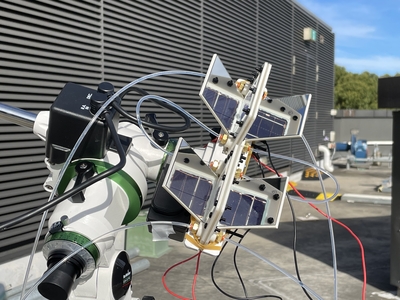
by Kate Mothes | Aug 28, 2024
Spanning 3,500 years of art, science, culture, and history, Tree: Exploring the Arboreal World surveys the awe-inspiring beauty and romance of trees. Forthcoming from Phaidon, the volume includes more than 300 illustrations ranging from ancient wall paintings and botanical illustrations to captivating photography and multimedia work by today’s leading artists.
Tree takes an expansive approach to the topic, introducing scientific and historical inquiry alongside artistic expression and documentation of the planet’s wide variety of species. More
Do stories and artists like this matter to you? Become a Colossal Member today and support independent arts publishing for as little as $5 per month. The article A New Book Branches Out Across 3,500 Years to Explore Our Enchantment with Trees appeared first on Colossal.

by Komoneed | Aug 27, 2024
Summer is zooming by and back-to-school season is upon us. If you’re like most parents,…
The post 5 Sustainable Swaps For A Green School Year appeared first on Earth911.

by Komoneed | Aug 26, 2024
This post was originally published on UNDPEthiopian Meteorology Institute kate.smith@undp.org Wed, 07/17/2024 –...

by Komoneed | Aug 26, 2024
Scientists from UNSW Sydney have come up with a novel way to sustainably produce ammonia, inspired by the natural process of photosynthesis. Their research has been published in the Journal of Energy and Environmental Science.
Ammonia is a gas that is essential for producing the fertilisers that support global agriculture and food production. However, traditional methods of making ammonia create significant greenhouse gas emissions, since fossil fuels are required for the hydrogen production and energy that power the process.
“Traditional ammonia production requires high temperatures — around 400–500°C — and high pressure, historically necessitating the use of fossil fuels,” said UNSW Scientia Professor Rose Amal, from the School of Chemical Engineering.
To address this problem, teams led by Amal and Professor Xiaojing Hao, from the School of Photovoltaic and Renewable Energy Engineering, developed a way to generate ammonium ions from nitrate-containing wastewater using only a specially designed solar panel that works like an artificial leaf. Using a process known as photoelectrocatalytics (PEC), the researchers placed on the panel a nanostructured thin layer of copper and cobalt hydroxide that acted as a catalyst for the chemical reaction needed to produce ammonium nitrate from the wastewater.
In a real leaf, photosynthesis is the process by which plants use sunlight, water and carbon dioxide to create oxygen and energy in the form of sugar. This new photoelectrocatalytic process mimics photosynthesis, with the solar panel acting like an artificial leaf, using sunlight and nitrate-containing wastewater to create ammonium nitrate.
Artificial leaf system developed at UNSW to create ammonia from wastewater using only the sun. Image credit: Chen Han/UNSW.
The research team, which includes lead author Chen Han and Dr Jian Pan (a DECRA fellow), built a 40 cm2 artificial leaf system on the roof of Tyree Energy Technologies building at UNSW that has been able to produce ammonium ions that can satisfy 1.49 m2 of cropland.
“We think this new technology could be implemented on a relatively small scale in agricultural locations to produce ammonium onsite, which would decentralise the production process and further reduce CO2 emissions that are associated with the transportation process,” Amal said.
“Our findings provide a clean, efficient and cost-effective solution for utilising solar energy and chemical wastes to produce ammonia and other value-added products,” Han added.
“You do not need a high concentration of ammonia in fertiliser, so we believe the amounts of ammonia we are producing using our system make it a viable application in the real world, although we definitely still have some ways to further improve it.”
The researchers hope that the generation of the ammonium from the wastewater will allow the processed water to be used to irrigate crops and further help them to grow.
“It’s important to acknowledge that the wastewater we convert isn’t coming directly from municipal waste or runoff — it still needs to be processed first to filter out the organic matters and particulates,” Amal said.
“But we are hopeful that once we have generated ammonium from the nitrate wastewater, the treated water can then be put into irrigation.”
Amal is keen for further collaboration and involvement with potential industry partners to develop the process into a fully viable commercial system.
“Industry partners would help us scale up this device, and we definitely would like to utilise a full-scale, traditionally sized solar panel for our application,” she said.
“This is important for helping us reach our emissions targets of 2030 and 2040, and ultimately achieving net zero by 2050. We want to produce ammonia in a cleaner and greener way that minimises CO2 emissions.”
Top image caption: The photoelectrode utilising nanostructured thin layer of copper and cobalt hydroxide helps to create ammonia from wastewater using only the sun. Image credit: Chen Han/UNSW.

by Komoneed | Aug 26, 2024
Wind farm operators in Australia are being encouraged to use the simple method of curtailment — increasing the wind speed required for turbines to start rotating — which a new study has found can drastically lower how many bats are killed by the enormous blades. The tactic is already being used in the United States, […]
The post Australia Could Prevent Thousands of Bats From Being Killed Each Year by Wind Turbines With Simple Fix, Study Finds appeared first on EcoWatch.





